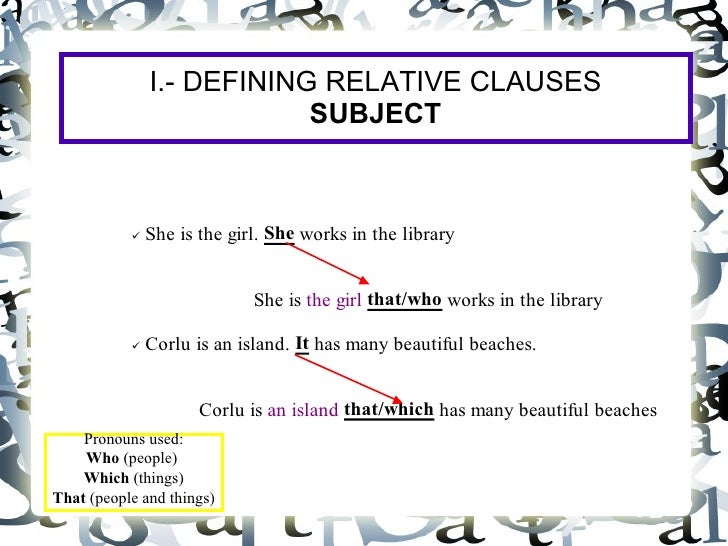Defining relative clauses
as relatives clauses u oraciones de relativo son frases que se unen a una oración principal y sirven para dar información sobre una persona, objeto o lugar que se ha mencionado previamente en la oración principal.
Son, por tanto, oraciones subordinadas que se unen a la frase principal mediante los relative adverbs or pronouns (pronombres o adverbios relativos), palabras que actúan como nexo entre ambas. Estos son: who, which, that, where, whom, whose, where, when, why. Los pronombres o adverbios relativos hacen referencia a la persona, objeto o lugar de la oración principal (lo que se conoce como antecedente) y lo sustituye.
Son, por tanto, oraciones subordinadas que se unen a la frase principal mediante los relative adverbs or pronouns (pronombres o adverbios relativos), palabras que actúan como nexo entre ambas. Estos son: who, which, that, where, whom, whose, where, when, why. Los pronombres o adverbios relativos hacen referencia a la persona, objeto o lugar de la oración principal (lo que se conoce como antecedente) y lo sustituye.
DEFINING RELATIVE CLAUSES (especificativas)
Las defining relative clauses se caracterizan por especificar a qué tipo de persona, cosa o lugar nos estamos refiriendo. Dan información necesaria para comprender a qué nos referimos. NO LLEVAN COMAS.
e book that is on the table is expensive (el libro que está encima de la mesa es caro)
Si quitamos la oración de relativo that is on the table, no sabríamos exactamente de qué libro se está hablando.
The book is expensive (el libro es caro) → ¿qué libro es caro?
Por tanto, la oración de relativo that is on the table es una defining relative clause ya que da información necesaria para comprender a qué libro nos estamos refiriendo.
The book that is on the table is expensive → ¿qué libro es caro? → El que está encima de la mesa
PRONOMBRES RELATIVOS
En las defining relative clauses se usan generalmente los pronombres relativos who, which y that,que en español equivaldrían a "que", "quien", "el cual", "la cual", "los cuales".


Comentarios
Publicar un comentario